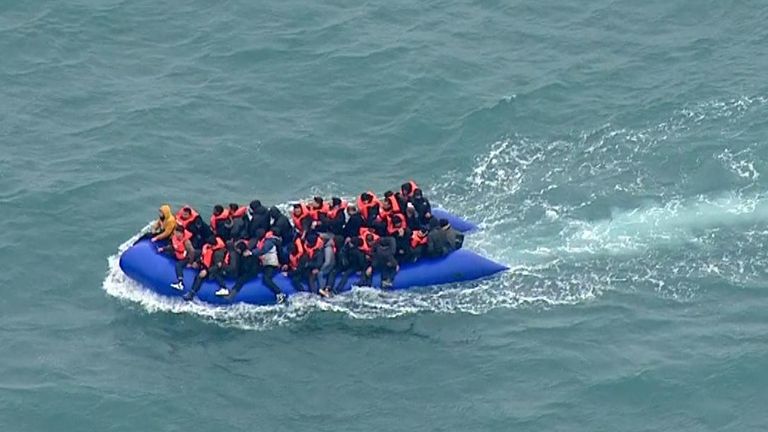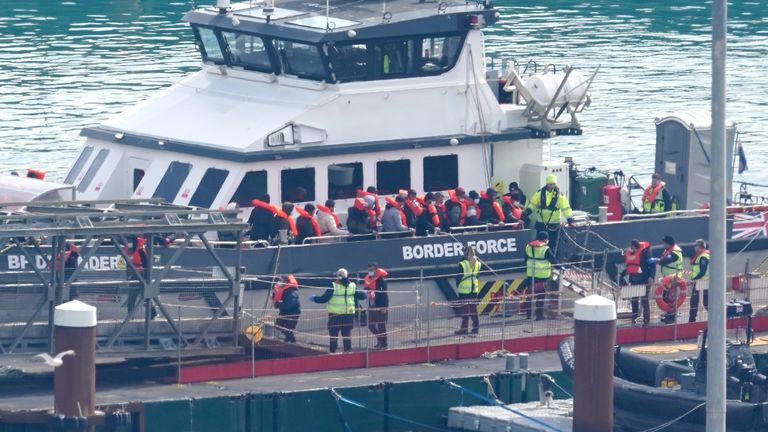Record number of migrants cross English Channel so far this year
The latest data exceeds the previous record high figure in the first three months of 2022 and had already surpassed the arrivals in the first few months of last year.
Wednesday 27 March 2024 12:52, UK
A record number of migrants have crossed the English Channel so far this year, according to provisional Home Office figures.
Some 4,644 have made the journey in 2024 - a record for the first three months of a calendar year.
Of the total, 338 people arrived in the UK in seven boats on Tuesday.
Politics latest: New figures spell trouble for one of Rishi Sunak's pledges
The latest data exceeds the previous record high figure of 4,548 for January to March 2022 and had already surpassed the 3,793 arrivals in the first few months of last year.
It comes despite Rishi Sunak's ongoing bid to "stop the boats" and the prime minister saying his plan was working.
Last week, Downing Street declared the government was dealing with a "migration emergency" after a record day for crossings.
Some 514 people made the journey in 10 boats on 20 March, making this the busiest day since the start of the year.
The "stop the boats" pledge was one of the prime minister's five priorities that he set out at the start of 2023, in which he said he would "pass new laws to stop small boats, making sure that if you come to this country illegally, you are detained and swiftly removed".
In keeping with this, last year a total of 29,437 migrants arrived in the UK after crossing the Channel, down 36% on a record 45,774 arrivals in 2022.
Read more:
Home Office launches social media ads in Vietnam
Video appears to show French police using aggressive tactics
But figures from this year show that so far, crossings are 23% higher than the same time in 2023, and 12% higher than the same time in 2022, according to analysis of government data by the PA news agency.
The government's Rwanda Bill also remains stuck in parliamentary limbo after a series of further defeats in the Lords, with MPs not scheduled to debate it again until after Westminster returns from its Easter break.
Be the first to get Breaking News
Install the Sky News app for free


'Time to get a grip'
Reacting to the figures on Wednesday, Labour said it was "time to get a grip and restore order to the border".
Stephen Kinnock, shadow immigration minister, said: "Despite all the evidence to the contrary, Rishi Sunak keeps on telling the British people that small boat arrivals are coming down and his promise to stop the boats remains on track.
"Can he not see what is happening from inside his No 10 bunker, or does he think we can't see it for ourselves?
"Either way, it's time to get a grip and restore order to the border."
He said a Labour government would strengthen border security, crush smuggling gangs, clear the asylum backlog, end hotel use and set up a new returns and enforcement unit.
In its latest statement on small boat crossings, the Home Office said: "The unacceptable number of people who continue to cross the Channel demonstrates exactly why we must get flights to Rwanda off the ground as soon as possible.
"We continue to work closely with French police who are facing increasing violence and disruption on their beaches as they work tirelessly to prevent these dangerous, illegal and unnecessary journeys.
"We remain committed to building on the successes that saw arrivals drop by more than a third last year, including tougher legislation and agreements with international partners, in order to save lives and stop the boats."



